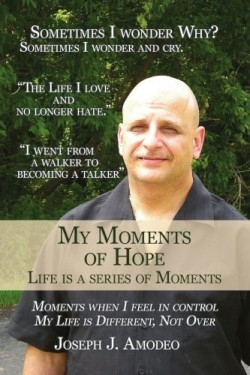It looks like you've stumbled upon a page meant to be read by our code instead of viewed directly. You're probably looking for this page.
My Moments of Hope
Life is a Series of Moments
“Poetry became my escape,” the author writes. “It became my way of expressing how Parkinson’s affected my life. It eventually became a safe way of communicating my feelings to the world that otherwise would have been left unsaid.”
Honestly, My Moments of Hope is not a great book of poetry. The rhyme scheme is forced, rhythms are off and the imagery is obvious. But none of those things matter, because this is no ordinary book of poems and Joseph J. Amodeo is no ordinary poet. Amodeo is a brave and determined man who has been fighting Young Onset Parkinson’s Disease for thirty years. His indomitable spirit and will to live transcend bad poetics.
The poetry and prose in My Moments of Hope isn’t like many self-published chapbooks that contain pretentious spiels on the environment or diatribes of moon-faced remarks about unrequited love. Amodeo’s poetry is a credo for anyone afflicted with a debilitating illness or searching for inspiration.
In a prose section called Searching for Hope, he offers advice on combining different types of therapy. For example, physical therapy and Christian healing combined with psychology and a good medication regimen helps maintain homeostasis. By keeping his body and mind strong Amodeo remains open to new experiences that allow him to make some wise and unforgettable observations. This statement about families is apt: “I believe all families are dysfunctional at times. Mine was no different. At times, due to issues in the household and favoritism, guilt seemed to outweigh dealing with issues appropriate in a timely manner.”
Amodeo’s best poem, Moments in Time, is also his shortest. Here he doesn’t worry about rhyme or length and his lines bite into the mind of the reader like a Zen Koan. “My darkest moment / My all-time low / Nowhere to go but up,” he writes. These three lines say so much more than his longer poems. For example, in Times Like These Are Sad Amodeo writes, “I remember the good times / there were so many we had / Growing up was fun / seeing you and my dad / having so much fun / Our families were always one / did everything together / I have so many fond memories / I’ll never forget them / not even one.” Looking past the greeting card sentiment in this poem is difficult. But Amodeo’s obvious love of life and his need to put down words more than make up for the nursery rhyme-like poems.
If he continues to write poetry seriously, Amodeo will soon exhaust the limitations of his current choice of style. Given time and a continuation of his relentless pursuit of staying alive which is his muse, he will eventually find his voice as a poet. What a voice it will be.
Disclosure: This article is not an endorsement, but a review. The publisher of this book provided free copies of the book and paid a small fee to have their book reviewed by a professional reviewer. Foreword Reviews and Clarion Reviews make no guarantee that the publisher will receive a positive review. Foreword Magazine, Inc. is disclosing this in accordance with the Federal Trade Commission’s 16 CFR, Part 255.
